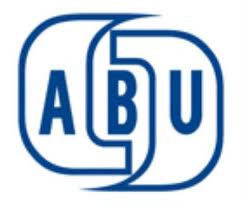 (Source: Asia-Pacific Broadcasting Union)
(Source: Asia-Pacific Broadcasting Union)
“Short wave will continue to be an important part of broadcasting, a coordinating conference hosted by the ABU in Kuala Lumpur has been told.
The 10th Global Shortwave Co-ordination Conference of the High Frequency Coordination Conference (HFCC) with the ABU and the Arab States Broadcasting Union (ASBU) from 20-24 January 2014 is part of the regular twice-yearly seasonal management of shortwave frequencies around the globe to coordinate usage and minimise interference.
Mr Bassil Zoubi, Head of Transmission at ASBU, said: “Shortwave programs will continue to be vital in addressing and communicating with some important parts of the world, especially with Internet penetration in the Arab countries around 34% while in some other parts of the worlds it is less than 10%.”
He said the ASBU had adopted T-DAB+ as a delivery platform for regional audio broadcasting, though the union continued to support [shortwave] DRM as a important delivery medium for international as well as national coverage, which was why the ASBU was calling for a universal radio chipset.
HFCC Chairman Mr Oldrich Cip said shortwave radio was important for travellers and isolated people, and it reached across the digital divide to the most disadvantaged and marginalised societies.
The International Federation of Red Cross and Red Crescent Societies had underlined this role of wireless radio in the 2013 World Disaster Report.
“It said that marginalised populations may not have the money or the knowledge to take advantage of the digital revolution,” Mr Cip said. “The report has noted that with only six per cent of people in low-income countries using the Internet in 2011, the digital divide was still stark and therefore access to low cost media technology was really the key.”
He also urged the conference that effort was needed to ensure that terrestrial broadcasting was part of the framework of the Global Strategy for Disaster Risk Reduction.
ABU Director of technology Dr Amal Punchihewa reiterated the importance of ensuring there were mechanisms in place to deliver information technology to the most needy and vulnerable populations around the globe.
“The ABU will continue to work with our partners to ensure this technology will survive and thrive for the benefit of the population, in times of crisis, in areas of isolation and at the most vulnerable times,’ he said.
Mr Gary Stanley, Rapporteur of the HFCC Steering Board, thanked the ABU for hosting the conference and said shortwave radio was still very important for disseminating news and information to regions where Internet penetration was low and other ways of receiving international media were limited.”

THE PATENT FLAWS IN THE LOGIC OF THIS REPORT AND FAR TO NUMEROUS TO EXPLAIN. FIRST FEW PEOPLE IN THE FIRST WORLD REALLY CARE MUCH ABOUT WHAT GOES ON IN THE THIRD WORLD GENERALLY. SECOND WHY HAVE NO POWERFULL SHORTWAVE TRANSMITTERS BEEN MADE ANYWHERE SINCE ABOUT 1980? THIRD WHY ARE SHORTWAVE SITES WORLDWIDE IN PLACES LIKE CANADA, EUROPE, RUSSIA, SOUTH AMERICA ECT. BEING HAULED TO THE SCRAPYARD AND THE LAND PUT TO OTHER USES? FIBER GOES EVERYWHERE NOW AND WITH IT CELL TOWERS AND CHEAP INTERNET BASED CHINESE MADE CELL PHONES. EVEN IN THE MOST POOR PLACES PEOPLE HAVE THEM EVEN IF THEY HAVE NO SHOES AS SHOWN BY VIDEOS FROM HAITI EARTHQUAKE